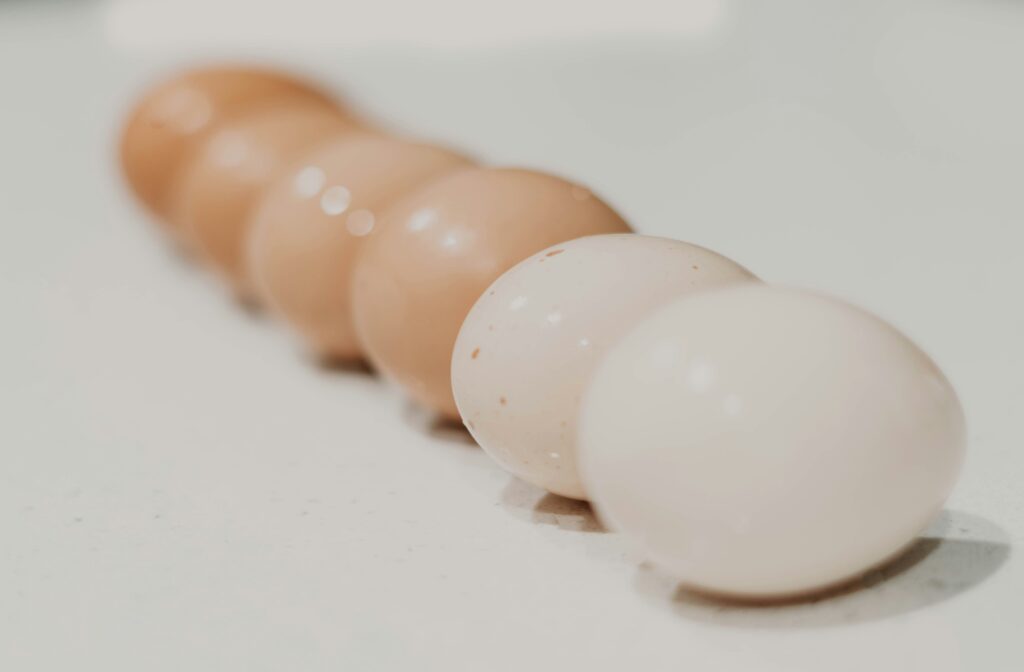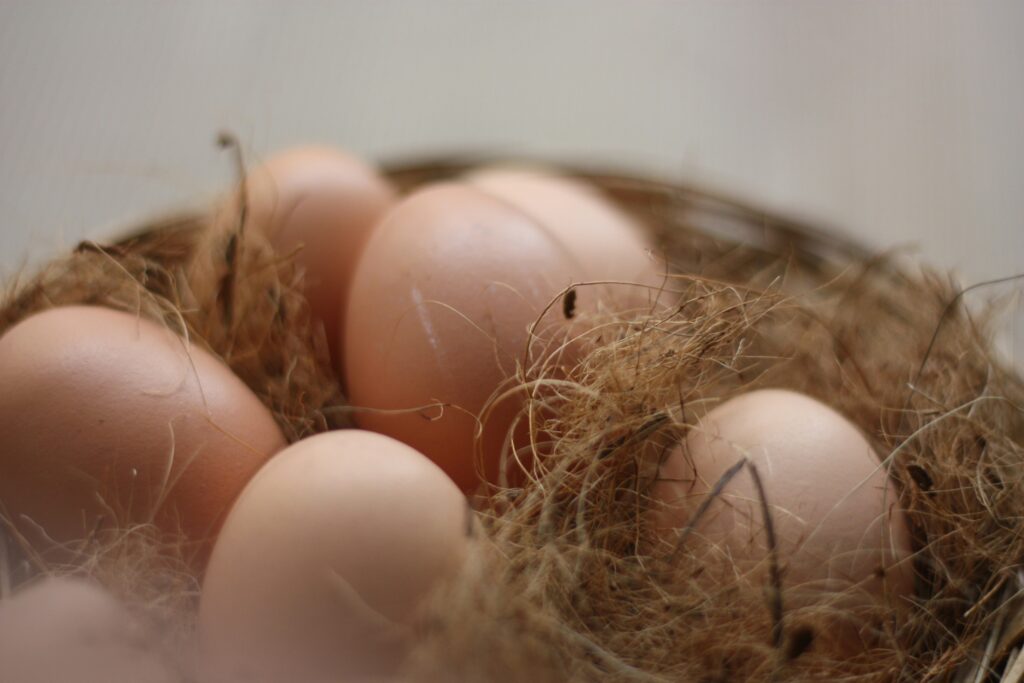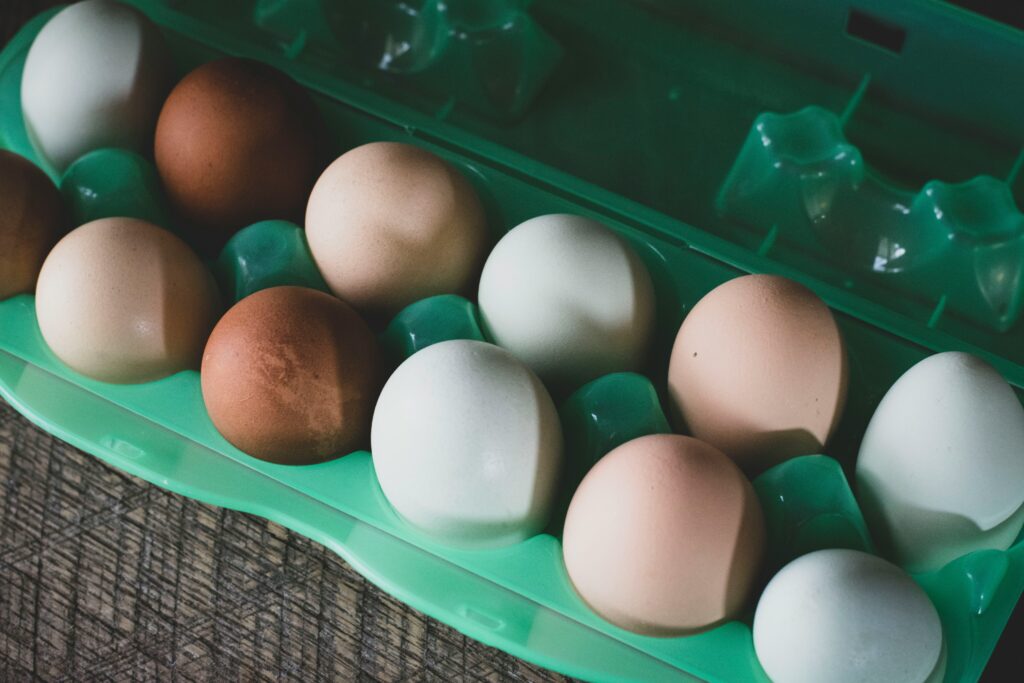What Makes Unwashed Eggs Unique?
Unwashed eggs, commonly found on farms or backyard coops, retain their natural protective coating called the bloom. Unlike commercial eggs in the U.S., which are washed and sanitized before sale, unwashed eggs are left in their natural state—making a big difference in how they should be handled and stored.
Bloom: Nature’s Protective Layer
The bloom (also known as the cuticle) acts as a biological barrier against bacteria like Salmonella. It seals the pores of the eggshell, reducing moisture loss and microbial invasion. That’s why unwashed eggs can safely be stored at room temperature for weeks in many parts of the world—particularly in Europe and rural communities.

Photo by Megan Nixon on Unsplash
Shelf Life of Unwashed Eggs
Room Temperature Storage Duration
When kept in a cool, dry place away from direct sunlight, unwashed eggs can stay fresh for up to 2–3 weeks without refrigeration. The optimal room temperature should be between 50°F and 68°F (10°C–20°C).
Refrigerated Storage: Extended Life
If you prefer refrigeration or live in a hot climate, unwashed eggs can last 2–3 months in the fridge while retaining flavor and quality. The bloom stays intact, providing extended freshness without the need for plastic wrap or airtight containers.
Comparison: Washed vs. Unwashed
| Storage Method | Washed Eggs Shelf Life | Unwashed Eggs Shelf Life |
| Room Temperature | Unsafe after 2 hours | 2–3 weeks |
| Refrigerated | 4–5 weeks | 2–3 months |
| Root Cellar (Cool/Dark) | 1–2 weeks | 1–2 months |
Washed eggs lose their protective layer and must be refrigerated immediately to prevent bacterial contamination, while unwashed eggs remain naturally safe for longer periods.
Factors That Affect Freshness
Temperature Fluctuations
Frequent shifts in temperature can cause condensation, weakening the eggshell and increasing the risk of spoilage. Whether stored on a countertop or in a fridge, stability is key to preserving egg freshness.
Humidity and Airflow
Too much humidity fosters mold growth; too little dries out the egg. Store eggs in a well-ventilated basket or carton that protects them from light while allowing moderate airflow.
Eggshell Integrity
Cracks or thin spots compromise the egg’s defenses, even if the bloom is intact. Always inspect eggs before storing them, and use cracked eggs within 24 hours after refrigerating.

Photo by Estudio Gourmet on Unsplash
How to Store Unwashed Eggs Properly
Storage Containers and Placement
Use egg cartons, baskets lined with straw, or ceramic egg holders. Always store eggs with the pointy end down—this helps keep the yolk centered and preserves the air cell at the top.
Pantry vs. Refrigerator
- Pantry: Ideal in cool climates or during colder months
- Refrigerator: Best in hot, humid regions or for long-term storage
- Pro Tip: Don’t move eggs back and forth between the fridge and room temp; it encourages condensation and bacteria.
Root Cellars and Traditional Storage
Root cellars offer the best of both worlds—cool, dark, and dry. Many homesteaders swear by storing eggs in root cellars for up to 2 months without sacrificing quality.
Country Practices: U.S. vs. Europe
Why Americans Wash Eggs
In the U.S., USDA regulations require commercial eggs to be washed and sanitized before sale to reduce Salmonella risk. Unfortunately, this removes the bloom and necessitates refrigeration.
European Egg Safety Philosophy
Europe, by contrast, discourages washing eggs. They focus on cleanliness in handling and production rather than post-collection sterilization. This enables European consumers to keep eggs unrefrigerated with confidence.
How to Tell If an Unwashed Egg Has Gone Bad
Float Test Explained
Fill a bowl with water:
- Sinks flat = Fresh
- Stands upright = Older, but usable
- Floats = Spoiled — discard immediately
Smell and Visual Inspection
A strong sulfur smell or any cracking and oozing are red flags. If in doubt, crack the egg in a separate bowl before using to check appearance and odor.
Common Myths About Unwashed Eggs
Myth: All Farm Eggs Are Safe Without Refrigeration
Not all farm-fresh eggs are stored properly. If they’ve been washed, they must be refrigerated, regardless of the source.
Myth: Washing Eggs Extends Their Freshness
Actually, it shortens it. Washing strips the bloom, opens the pores, and accelerates aging unless the egg is immediately refrigerated.
Using Unwashed Eggs in Cooking and Baking
Best Uses for Fresh vs. Older Eggs
- Fresh eggs: Ideal for poaching and frying
- Older eggs: Better for baking and hard boiling (easier to peel)
Are Unwashed Eggs Safe for Raw Consumption?
Only if you trust the source and the egg is very fresh. Still, it’s smart to avoid raw egg consumption if you’re pregnant, immunocompromised, or cooking for children.

Photo by jaikishan patel on Unsplash
Safety Tips for Backyard Chicken Owners
When and How to Clean Eggs if Needed
Only wash eggs if absolutely necessary. Use warm running water and a soft brush. Avoid soaps or detergents, which can penetrate the shell.
Storage Best Practices Post-Laying
Collect eggs daily, inspect them for cracks, and avoid stacking them high. Keep track of laying dates using a pencil mark on the shell.
The Science Behind the Egg Cuticle
Composition and Role of the Bloom
The cuticle is a thin, protein-based coating that naturally covers the shell. It guards against bacteria and moisture loss—nature’s built-in armor.
How Washing Affects Porosity
Washing opens up the eggshell’s ~17,000 pores, making it vulnerable to contaminants. Once the bloom is gone, the shell becomes a two-way street for moisture and microbes.
FAQs About Unwashed Eggs
1. Can you leave unwashed eggs out overnight?
Yes, if they’ve never been refrigerated or washed. Store them in a cool, dry place.
2. Do unwashed eggs last longer than washed ones?
Absolutely. The bloom allows them to stay fresh longer, especially when stored at room temperature or in a cool cellar.
3. Should I refrigerate unwashed farm eggs?
Only if you live in a hot or humid environment or plan to store them longer than 2–3 weeks.
4. What happens if you wash unwashed eggs?
You remove the bloom, which reduces their shelf life and makes them more prone to contamination.
5. Can I sell unwashed eggs legally?
Depends on your region. Many states in the U.S. allow direct farm-to-consumer sales of unwashed eggs with appropriate labeling.
6. How do you test the freshness of unwashed eggs?
Try the float test or check for odor and shell condition. Fresh eggs sink, spoiled ones float.

Photo by Katie Bernotsky on Unsplash
Conclusion: Keeping Unwashed Eggs Safe and Fresh
Unwashed eggs are a natural marvel—designed by nature to resist spoilage and stay fresh without modern refrigeration. By understanding the role of the bloom, proper storage methods, and how to test for freshness, you can enjoy delicious, nutrient-rich eggs from your backyard or farmer’s market for weeks on end. Always trust your senses, store smart, and respect nature’s design.
